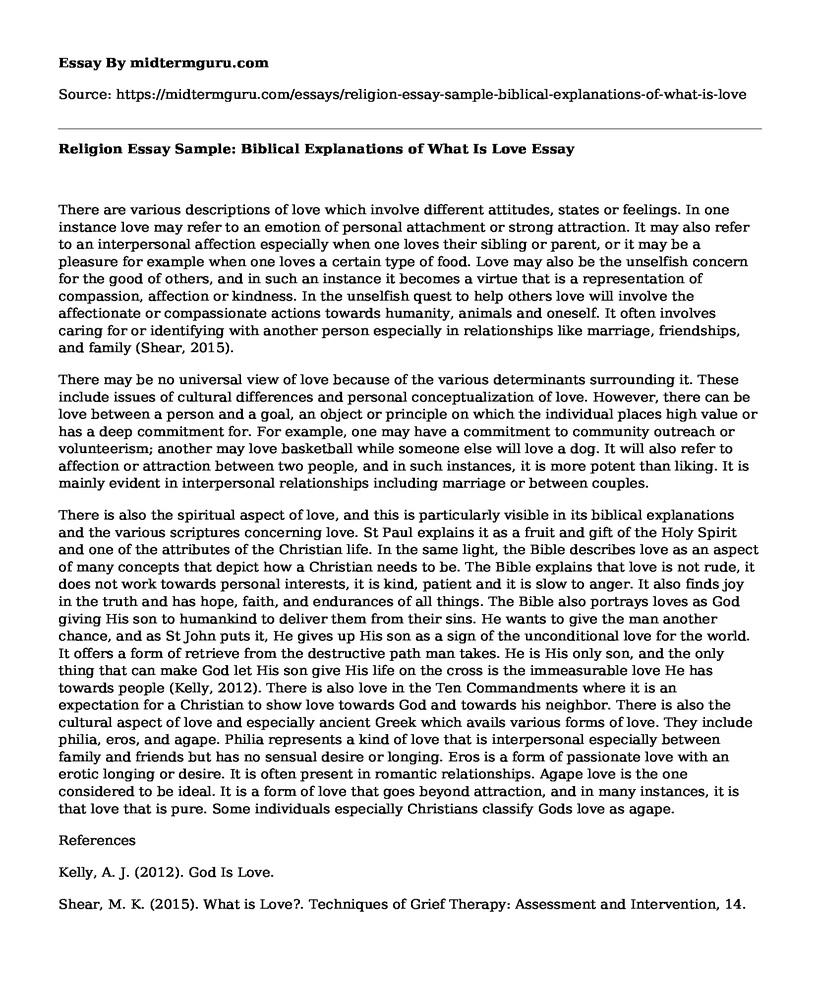There are various descriptions of love which involve different attitudes, states or feelings. In one instance love may refer to an emotion of personal attachment or strong attraction. It may also refer to an interpersonal affection especially when one loves their sibling or parent, or it may be a pleasure for example when one loves a certain type of food. Love may also be the unselfish concern for the good of others, and in such an instance it becomes a virtue that is a representation of compassion, affection or kindness. In the unselfish quest to help others love will involve the affectionate or compassionate actions towards humanity, animals and oneself. It often involves caring for or identifying with another person especially in relationships like marriage, friendships, and family (Shear, 2015).
There may be no universal view of love because of the various determinants surrounding it. These include issues of cultural differences and personal conceptualization of love. However, there can be love between a person and a goal, an object or principle on which the individual places high value or has a deep commitment for. For example, one may have a commitment to community outreach or volunteerism; another may love basketball while someone else will love a dog. It will also refer to affection or attraction between two people, and in such instances, it is more potent than liking. It is mainly evident in interpersonal relationships including marriage or between couples.
There is also the spiritual aspect of love, and this is particularly visible in its biblical explanations and the various scriptures concerning love. St Paul explains it as a fruit and gift of the Holy Spirit and one of the attributes of the Christian life. In the same light, the Bible describes love as an aspect of many concepts that depict how a Christian needs to be. The Bible explains that love is not rude, it does not work towards personal interests, it is kind, patient and it is slow to anger. It also finds joy in the truth and has hope, faith, and endurances of all things. The Bible also portrays loves as God giving His son to humankind to deliver them from their sins. He wants to give the man another chance, and as St John puts it, He gives up His son as a sign of the unconditional love for the world. It offers a form of retrieve from the destructive path man takes. He is His only son, and the only thing that can make God let His son give His life on the cross is the immeasurable love He has towards people (Kelly, 2012). There is also love in the Ten Commandments where it is an expectation for a Christian to show love towards God and towards his neighbor. There is also the cultural aspect of love and especially ancient Greek which avails various forms of love. They include philia, eros, and agape. Philia represents a kind of love that is interpersonal especially between family and friends but has no sensual desire or longing. Eros is a form of passionate love with an erotic longing or desire. It is often present in romantic relationships. Agape love is the one considered to be ideal. It is a form of love that goes beyond attraction, and in many instances, it is that love that is pure. Some individuals especially Christians classify Gods love as agape.
References
Kelly, A. J. (2012). God Is Love.
Shear, M. K. (2015). What is Love?. Techniques of Grief Therapy: Assessment and Intervention, 14.
Cite this page
Religion Essay Sample: Biblical Explanations of What Is Love. (2021, May 31). Retrieved from https://midtermguru.com/essays/religion-essay-sample-biblical-explanations-of-what-is-love
If you are the original author of this essay and no longer wish to have it published on the midtermguru.com website, please click below to request its removal:
- Brief Retelling of Parables
- Essay on the Thoughts of Augustine in the City of God
- Essay on Philosophy of Theodicy
- Essay on Welton's Article: Can Buddhism Save the World?
- Religion Essay Sample: Biblical Explanations of What Is Love
- Paper Example on Issues of Marriage and Sexuality in Christianity
- Interpretation of Joshua Chapter 4 - Paper Example







